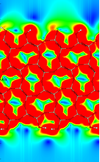Kinetic Monte Carlo

The kinetic Monte Carlo (KMC) method is a Monte Carlo method of computer simulation used to simulate the time evolution of processes. The algorithms underlying the KMC algorithm are known by a variety of other names such as residence-time, n-fold way or the Bortz-Kalos-Liebowitz (BKL) algorithms. KMC is particularly useful for investigating the dynamics of systems in which there are rare events occurring, because the computational speed of the simulation is limited by the slowest event. Hence, KMC can reach much longer time scales than using other simulations techniques that proceed linearly with time, such as classical Molecular Dynamics simulations. KMC also offers the advantage over traditional Monte Carlo approaches that it can be used to study non-equilibrium processes as they evolve through time. The key disadvantage of the technique is that it provides no information of the timescale of the elementary processes; these timescales must be parameterised either from ab initio calculations or experiments.
For queries about this topic, contact Benjamin Lowe.
Projects

Investigation into the Interfacial Physics of Field Effect Biosensors
Nicolas Green, Chris-Kriton Skylaris (Investigators), Benjamin Lowe
This interdisciplinary research aims to improve understanding of Field Effect Transistor Biosensors (Bio-FETs) and to work towards a multiscale model which can be used to better understand and predict device response.
People
 Nicolas Green
Nicolas GreenReader, Electronics and Computer Science (FPAS)
 Chris-Kriton Skylaris
Chris-Kriton SkylarisLecturer, Chemistry (FNES)
 Benjamin Lowe
Benjamin LowePostgraduate Research Student, Electronics and Computer Science (FPAS)
 Marijan Beg
Marijan BegExternal Member, Imperial College London
 Daisuke Sasaki
Daisuke SasakiNone, None